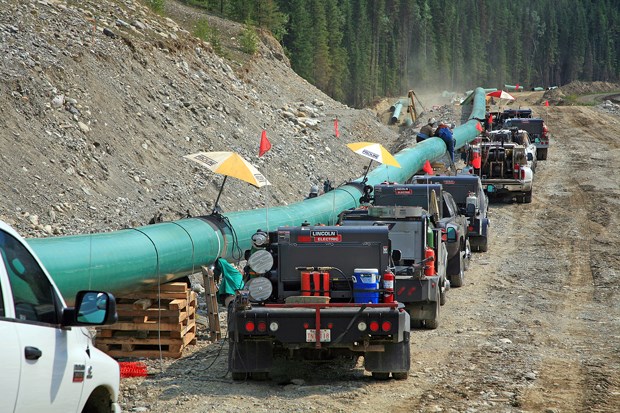The Trans Mountain pipeline expansion project has failed to gain social licence from the provincial government, or any Lower Mainland municipality or First Nation, and the National Energy Board (NEB) – facing an overhaul from the federal government – should simply shut down the hearings underway to consider the project.
That was the recommendation from the City of Burnaby on Wednesday, during Day 2 of a 10-day NEB hearing into the $7-billion pipeline expansion proposal.
In a fiery double-barrel blast, Gregory McDade, legal counsel for the City of Burnaby, fired one barrel at Kinder Morgan Inc., the company behind the expansion project, and the other at the NEB panel itself.
Citing Prime Minister Justin Trudeau’s promise to overhaul the NEB, which he criticized for becoming politicized, McDade said, “Burnaby should not be the last victim of a flawed process.
“The City of Burnaby calls upon this panel to suspend these hearings,” McDade said. “We call upon this panel to reset the process in a way that keeps faith with the public trust that the prime minister of Canada has claimed he has.”
McDade quoted Trudeau, who said, “Governments grant permits, but only communities grant permission.”
“Let me be clear, this pipeline does not have community permission,” McDade said. “Not from the community of Burnaby, nor from any of the Lower Mainland municipalities, nor from the public or the Government of British Columbia.”
The NEB process has been criticized for not allowing Trans Mountain to be cross-examined and for failing to answer many of the 17,000 questions that were put to it in writing.
“This is the first serious NEB hearing involving a major project ever to have denied cross-examination to test the evidence,” McDade said.
“Trans Mountain, in their argument to you, claims this was a rigorous process because there were 17,000 questions and 400 interveners. They failed to note that most of those questions were never answered by them and that your panel subsequently rejected 95 per cent of the motions for better answers.”
The Trans Mountain pipeline was originally built in the 1950s and fed a number of B.C. refineries that made gasoline, diesel and jet fuel for domestic use.
The Chevron plant in Burnaby, where the pipeline terminates, is the only refinery left in the Lower Mainland. As it stands, it has to compete with other companies for the oil that moves from the pipeline.
A twinning of the pipeline would triple its carrying capacity. But that’s by no means a guarantee that the Chevron refinery will necessarily have access to more oil. Of the 890,000 barrels per day an expanded pipeline would move, 707,500 barrels are spoken for by 13 shippers in offtake agreements, with the oil destined for refineries outside of Canada.
“This is not a pipeline, I say, to bring oil to the Lower Mainland to supply local industry, to bring us gasoline, as the pipeline was in the 1950s,” McDade said. “This is a pipeline solely for export. No benefits to B.C. at all, but all the burdens and all the risk are borne here.”
Of the 49 interveners making oral presentations at the Burnaby public hearings, 19 are B.C. First Nations, including three key Lower Mainland groups – the Squamish, Musqueam and Tsleil-Waututh – all of whom are opposed to the project.
The expanded pipeline would increase oil tanker traffic to 34 per month from the current five. Musqueam Councillor Morgan Guerin said on Jan. 19 that the wake caused by tankers means small fishing vessels would have to stop every time a tanker goes by.
The Musqueam would view that as a potential infringement of their aboriginal rights to fish – a right that was affirmed in the landmark Sparrow case.
Because those rights exist, James Reynolds, lawyer for Musqueam, said there is a duty on the Crown to consult with the Musqueam on the project and to justify any infringements on their fishing rights that might result.
“In our submission the Crown has done neither,” Reynolds said.
The NEB hearings continue this week in Burnaby, and next week through Jan. 29.



